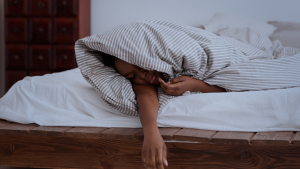
There are many fluctuations in sleep dramas that occurs over the seasons. We all have our preferences for season and temperature on a personal and individual level. But there are population level differences in the quantity and quality of sleep that relate to seasons too. This seems to be affected by both light exposure and also temperature. The circadian rhythm is slightly more than 24 hours, so it requires entrainment by light exposure as the main influencer of our circadian rhythm. The circadian rhythm controls a bewildering number of functions from body temperature to urine production, so a little thing like the seasons changing actually has a significant impact on our body rhythms.
There have been a number of studies looking at extreme forms of seasons – for example in Antarctica, where people are deprived of sunlight for many months. This research is a very helpful way to learn about the impact of light on the regulation of our circadian rhythm. But it’s perhaps less useful because the population density at the poles is very low. What is arguably more helpful for a mass audience is learning about seasonal shifts and daylight savings on our body rhythms.
Well, I did some digging to save you a job, and there are actually quite a few studies that have explored the impact of seasons on the quality and quantity of our sleep. Hashizaki et al (2018) published a study of nearly 2000 Japanese adults who were fitted with a biomotion device for 3 years and found that people tended to wake up 30 minutes later in the winter. So if you struggle to wake up and get going in the dull winter months you’re in good company! The study also found that sleep was disturbed both by extremes of hot and cold weather, but provided bedding was seasonally appropriate, this effect could be mitigated. So check your duvet weight people! If you’re cold, now is the time to dig out your winter weight duvet.
Another study in Norway found that people have more sleep onset problems in Winter, and this is echoed in multiple studies. Several researchers have found that in general, in the winter months, people tend to go to bed later, wake up later, have more REM sleep and less deep (NREM 3) sleep.
So why does this happen? Well – light exposure causes the release of serotonin, which not only makes us feel good, but also is used by the body to make melatonin – your sleep onset hormone. So those long dark days with little sunlight will make it harder for you to feel good, and also to get enough serotonin.
It’s not just sunlight though. Colder weather brings a barrage of respiratory and other illnesses. Contrary to popular belief, it’s not the cold weather per se, but the fact that when the weather is cold, we all tend to congregate inside where bugs can more easily spread quickly. Respiratory illnesses play havoc with sleep.
Central heating can also make us feel dry, or make us wake up more. If we get the temperature wrong, we might also wake up sweating or freezing. Gah!
What can you do to improve your winter sleep?
- Try to get up the same time each day, including at weekends
- Check the weight of your duvet
- Try a clock that emits broad spectrum light to wake you up in the morning
- Get outside as early as you can in the morning
- Maintain usual bedtime routines
- Be mindful about calorie intake – often when the nights draw in and baggy jumpers come out, we snack our way through the evening (looking at myself here too!!)
- Carbohydrates increase serotonin, which can be reduced in the winter with less light exposure, so be careful about diets that attempt to eliminate carbs…
- Keep up your exercising
- Make sure you take your Vitamin D supplement
Whether you relish the changing of the seasons, or dread it, I hope you manage to optimise your sleep over the Autumn and Winter months.
If you need more support with your little one’s sleep, you might find the following helpful:
My sleep guides for 0-18 months, 18-36 months and 3-6 years
Lyndsey Hookway is a paediatric nurse, health visitor, IBCLC, holistic sleep coach, PhD researcher, international speaker and author of 4 books. Lyndsey is also the Co-founder and Clinical Director of the Holistic Sleep Coaching Program, co-founder of the Thought Rebellion, and founder of the Breastfeeding the Brave project. Check Lyndsey’s speaker bio and talk brochure, as well as book her to speak at your event by visiting this page. All Lyndsey’s books, digital guides, courses and webinars can be purchased here, and you can also sign up for her free monthly newsletter here.
